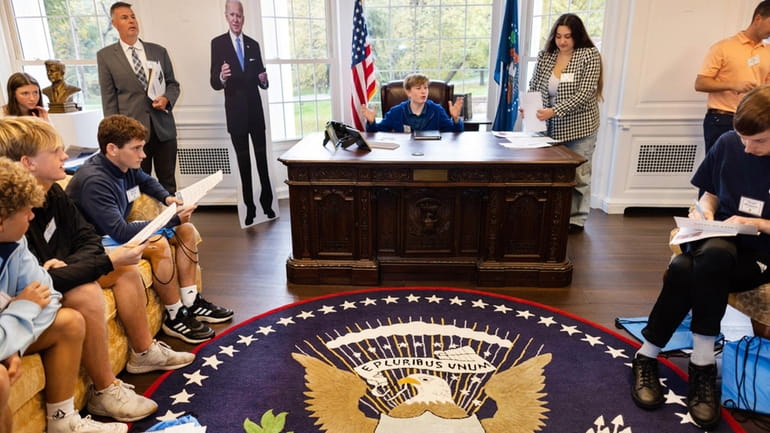Changing America's political tone starts in our classrooms

Long Island high school students get an Immersive "White House Experience" at Long Island University's Roosevelt School Civics Day Event in October 2023, in Brookville. Credit: Debbie Egan-Chin
With a presidential election just months away, many Americans are enduring 2024 with a sense of dread.
The AP-NORC Center for Public Affairs Research found 68% of adults are pessimistic about American politics. Adults responding to a Pew Research Center study described feeling “exhausted” and “angry” when thinking about politics today.
Americans are scarred by the divisive rhetoric dominating today’s political discourse and have little hope the rest of 2024 will be any better. But we can take a definitive step in every community to begin improving the tone of our discussions about even the most contentious issues. We must prioritize civics and history education in our local schools, and send teachers clear messages of support.
At the Bill of Rights Institute, we serve 75,000 civics and history teachers who reach approximately 7.5 million students per year. Civics and history education help students understand our nation’s story, its laws, and their rights and responsibilities as citizens.
David J. Bobb is president and CEO of the Bill of Rights Institute, a nonpartisan, nonprofit organization advancing civics and history education. The Fulcrum is a nonprofit, nonpartisan news platform covering efforts to fix our governing systems. It is a project of, but editorially independent from, Issue One.
Just as important, civics and history classrooms enable students to engage in structured civil discourse around even the most difficult, polarizing topics. They learn, under the supervision of trained adults, to form fact-based arguments, listen to opposing viewpoints and debate civilly.
Kristin Monteith, a veteran middle school history teacher from Massachusetts, uses platforms like Think the Vote to help students engage in structured civil discourse around current events with peers nationwide.
One of her students, Esme Milde, said these activities help her discover more facts about her own beliefs, and “explore the opposite opinion and receive a different perspective.”
We should want students to be exposed to diverse viewpoints, thinking critically and engaging productively, even with people they disagree with. Unfortunately, we make it difficult for civics and history teachers to help students develop these skills.
Several states passed legislation or issued administrative rules barring or limiting teaching of certain “controversial” topics, including elements of American history, racism and gender discrimination. While these efforts vary by state, the chilling effect is national.
Many teachers are now afraid to discuss contentious issues, including current events, in classrooms. They fear being misunderstood, or facing blowback from administrators, parents, or communities.
A RAND Corporation report, appropriately titled “Walking on Eggshells,” discovered curriculum bans may influence teaching even in states where no bans exist. The culture of fear is pervasive.
We are not going to ban our way to better civics and history education in America. We are not going to ban our way to healthier discourse, either.
To improve the tone of political discourse, give young people tools to do better. Civics and history classrooms offer an ideal setting for students to engage in productive, respectful conversations about current events, government and our past.
When civics and history are taught well, students develop civil discourse, critical thinking and citizenship skills that strengthen communities.
This year, more than ever, civics and history educators must understand we support their work. We must have their backs — instead of asking them to look over their shoulders.
Parents, as our children’s first teachers, are essential to this process. There are two steps every parent of school-aged children can take to support educators:
There is little doubt this is a challenging year for civil discourse. By supporting civics and history classrooms, we can build something better for the future.
